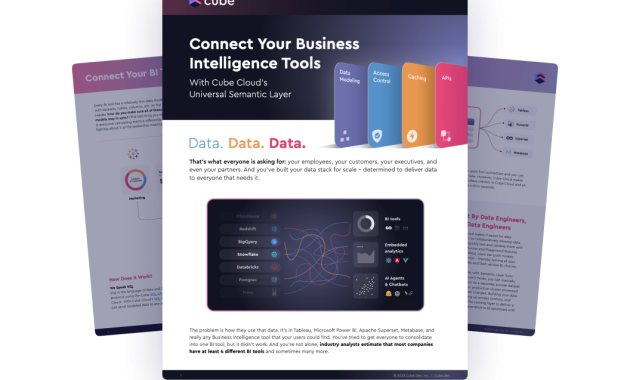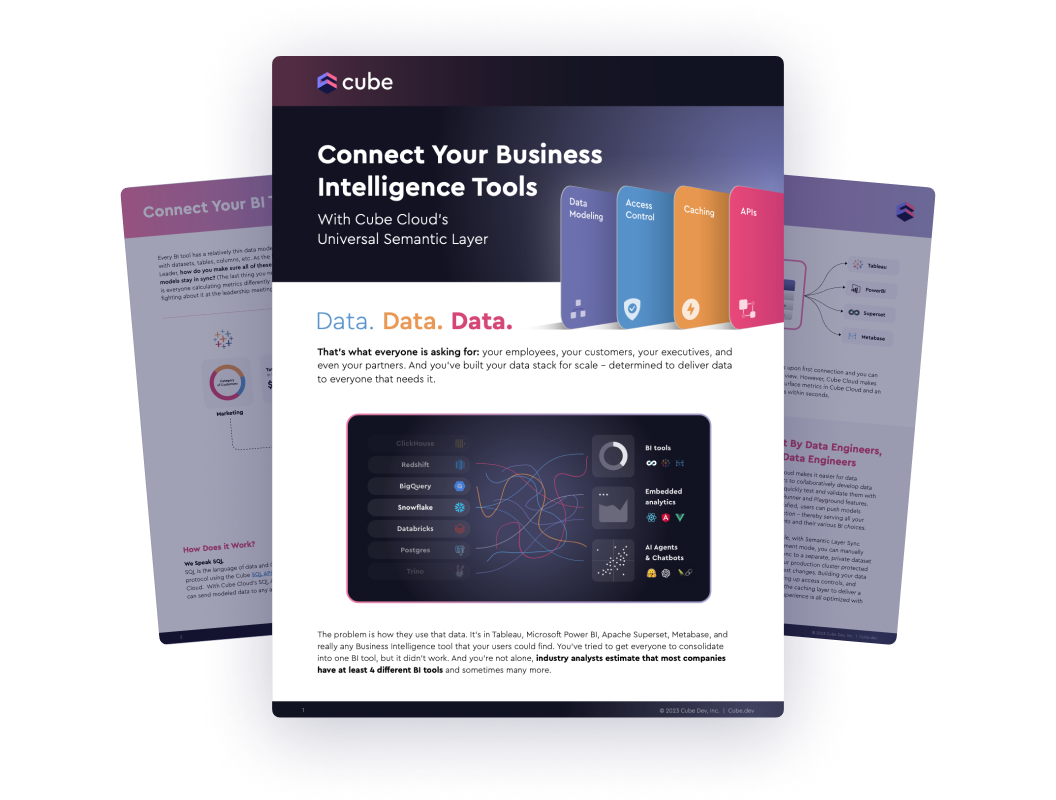
Business Intelligence Tools That Version Your Datasets: A Deep Dive
In the rapidly evolving landscape of data analytics, the ability to effectively manage and track changes to your datasets is no longer a luxury but a necessity. This is where Business Intelligence (BI) tools that version your datasets come into play. These tools provide a crucial layer of control, enabling businesses to maintain data integrity, facilitate collaboration, and ensure the accuracy of their insights. This article delves into the significance of versioning in BI, explores the features of leading tools, and examines the benefits of adopting this critical practice.
The Imperative of Data Versioning
Data is the lifeblood of modern business. Decisions, strategies, and future projections are all predicated on the information gleaned from data analysis. However, data is not static. It changes, it evolves, and it is frequently updated. Without a robust system for versioning, tracking these changes becomes an arduous task, potentially leading to errors, inconsistencies, and a loss of valuable insights. Business Intelligence tools that version your datasets address this core challenge.
Versioning allows users to:
- Track Changes: Monitor every alteration made to a dataset, including who made the change and when.
- Revert to Previous Versions: Easily restore datasets to earlier states, mitigating the impact of errors or data corruption.
- Enhance Collaboration: Facilitate seamless collaboration among data analysts and other stakeholders.
- Improve Data Governance: Maintain data lineage and ensure compliance with regulatory requirements.
The absence of versioning can result in significant problems. It can undermine confidence in data-driven decisions, hinder the ability to reproduce results, and complicate the troubleshooting process. Investing in Business Intelligence tools that version your datasets is an investment in data quality and reliability.
Key Features of Dataset Versioning Tools
The most effective Business Intelligence tools that version your datasets offer a comprehensive set of features designed to streamline data management and analysis. These features often include:
- Version Control: The core functionality of tracking changes to datasets over time. This includes creating snapshots of data, recording timestamps, and identifying the user who made the modifications.
- Data Lineage: A clear history of data transformations, documenting how data has been processed and modified. This is crucial for understanding the origins of data and ensuring its accuracy.
- Collaboration Features: Tools that enable multiple users to work on the same datasets simultaneously, with mechanisms for conflict resolution and version merging.
- Audit Trails: Detailed records of all activities performed on a dataset, including access logs and change history.
- Integration Capabilities: The ability to integrate with other data sources, BI platforms, and data warehousing solutions.
- Rollback and Restore: The capacity to revert to previous versions of a dataset in case of errors or data corruption.
The specific features offered by each tool can vary. However, the presence of these core functionalities is essential for effective data versioning.
Leading Business Intelligence Tools with Dataset Versioning Capabilities
Several leading Business Intelligence tools that version your datasets provide robust versioning features. The choice of which tool to use will depend on the specific needs and existing infrastructure of your organization. Here are some of the most popular options:
Tableau
Tableau is a widely used BI platform known for its intuitive user interface and powerful visualization capabilities. While Tableau does not provide direct dataset versioning within its core platform, it integrates well with data source versioning tools. Users can often leverage version control through the data sources themselves, like databases or cloud storage, which Tableau then accesses. Tableau’s strength lies in its ability to connect to a wide range of data sources and visualize the data effectively. Its collaboration features allow users to share and collaborate on dashboards and reports, but the versioning of the underlying data typically resides in the data source.
Microsoft Power BI
Power BI, a powerful and versatile BI platform from Microsoft, offers a range of features, including data versioning capabilities. Power BI integrates with data sources that support versioning, such as Azure Data Lake Storage and SQL Server. Users can leverage these platforms to track changes to their data. Power BI also has built-in features for managing data flows and data models, making it easier to track changes and maintain data integrity. Power BI’s integration with the Microsoft ecosystem and its ability to handle large datasets make it a strong contender for many businesses.
Looker (Google Cloud)
Looker, now part of Google Cloud, emphasizes data governance and version control. Looker’s core design incorporates version control through its integrated Git-based versioning for LookML, its modeling language. This enables users to track changes to their data models and ensure that data transformations are properly documented and reproducible. Looker’s data governance features, along with its focus on data modeling, make it a suitable choice for businesses that prioritize data quality and control.
Alteryx
Alteryx is a powerful data analytics platform that enables users to prepare, blend, and analyze data. Alteryx offers robust versioning capabilities, allowing users to track changes to their workflows and data. Alteryx’s version control features help users to maintain data integrity and ensure that their analytical processes are reproducible. Its drag-and-drop interface and extensive library of data preparation tools make it a favorite among data analysts.
Benefits of Implementing Dataset Versioning
The implementation of Business Intelligence tools that version your datasets provides numerous benefits across an organization. These benefits extend beyond data management to affect decision-making, compliance, and operational efficiency. Key advantages include:
- Improved Data Accuracy and Reliability: Versioning helps to identify and correct errors, ensuring that data used for analysis is accurate and reliable.
- Enhanced Decision-Making: Accurate and reliable data leads to more informed and effective decision-making.
- Streamlined Collaboration: Version control facilitates seamless collaboration among data analysts and other stakeholders.
- Simplified Data Governance: Versioning helps to maintain data lineage and ensure compliance with regulatory requirements.
- Increased Efficiency: Version control reduces the time and effort required to troubleshoot data issues and reproduce results.
- Reduced Risk: Versioning protects against data loss and corruption, minimizing the risk of business disruption.
These benefits highlight the importance of investing in Business Intelligence tools that version your datasets. It is an investment that provides a clear return in terms of data quality, operational efficiency, and business outcomes.
Choosing the Right Tool for Your Needs
Selecting the right Business Intelligence tools that version your datasets depends on several factors. Consider these points when making your decision:
- Data Sources: Evaluate the compatibility of the tool with your existing data sources.
- Features: Ensure that the tool offers the versioning features you require.
- Scalability: Choose a tool that can handle the volume and complexity of your data.
- Integration: Consider the integration capabilities of the tool with other BI platforms.
- User Interface: Select a tool with an intuitive and user-friendly interface.
- Cost: Evaluate the cost of the tool, including licensing fees and implementation costs.
- Support and Training: Consider the availability of support and training resources.
By carefully evaluating these factors, you can choose the right Business Intelligence tools that version your datasets to meet your specific needs.
The Future of Data Versioning in BI
The importance of data versioning is only going to increase. As businesses generate more data and rely on data-driven insights, the need for robust data management practices will become even more critical. The future of data versioning in BI will likely see advancements in several areas:
- Increased Automation: Automating the versioning process to reduce manual effort.
- Advanced Analytics: Using advanced analytics to identify and understand data changes.
- Integration with AI/ML: Integrating versioning with AI/ML models to track changes to models and data.
- Improved Collaboration Tools: Developing more collaborative tools to facilitate teamwork.
Investing in tools with advanced features is a step toward future-proofing your data strategy. As the field of data analytics evolves, businesses will need to stay informed about the latest advancements in data versioning. This proactive approach will ensure that they can make the most of their data assets.
Conclusion
Business Intelligence tools that version your datasets are essential for any business that relies on data-driven decision-making. These tools provide a means to track changes, ensure data integrity, and facilitate collaboration. By carefully selecting the right tool and implementing versioning best practices, businesses can unlock the full potential of their data. The benefits of versioning, including improved data accuracy, streamlined collaboration, and reduced risk, make it a strategic investment for any organization.
The ability to effectively manage and track data changes is no longer a luxury but a core requirement for success in today’s data-driven environment. As businesses continue to generate and leverage data, the importance of Business Intelligence tools that version your datasets will only increase.
[See also: Data Governance Best Practices]
[See also: Data Lineage Explained]
[See also: The Importance of Data Quality]

